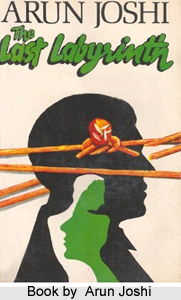 An illustrious novel The Last Labyrinth, ideally depicts the carziness, pain, agony, selfishness of love. The title of the story is self-explanatory in sense that at the end of the story one of the characters Anuradha disappeared in the last labyrinth to hide herself from the central character Som.
An illustrious novel The Last Labyrinth, ideally depicts the carziness, pain, agony, selfishness of love. The title of the story is self-explanatory in sense that at the end of the story one of the characters Anuradha disappeared in the last labyrinth to hide herself from the central character Som.
Arun Joshi was born in Varanasi in the year of 1939. He was the son of a eminent botanist and academician. He is a prolific writer completed his higher education in the US, and returned to India to become an industrial manager. He was awarded a scholarship to the US where is abtained a degree in Engineering and Industrial Management from the university of Kansas. In today`s world of book-promos and PR writing in foreign language become easier. But at that time Arun Joshi would be a misfit as he kept himself out of the limelight without any advertisements of his books. During that era only some eccentric people were writing in English. His novels delving into existential philosophy along with the ethical choices won him huge critical appreciation in India. But he was not that much popular in the West. The author also won the Sahitya Akademi Award in 1982 for The Last Labyrinth. His unique fictional technique contributed a lot in the field of literature. He was working in mental hospital with chronic schizophrenics, which has helped him a lot in later days in many of his works.
Synopsis:
`The Last Labyrinth` by Arun Joshi is the story of Som Bhaskar. This is a unique character. The dichotomy in his character apparent through his name itself, which means Moon-Sun. He is a 25-year-old who inherits his father`s vast industrial wealth. Som is married to Geeta who a devotional woman. But he is attracted by Anuradha also who is an alluring and mysterious woman. She is also married to some Aftab, a businessman, but Som finds her so irresistible. In the whole novel the way of getting her is described in a vivid manner. Her conduct is beyond Som`s comprehension. She accepts, rejects, or flees from him without warning, and he even suspects that she has some agreement with Geeta. The situation drives Som to the brink of death from a heart attack, but he miraculously survives while Anuradha disappears without a trace. After his recovery, he is hell-bent upon finding Anuradha. His frantic pursuance to search Anuradha leads him through absurd situations. Som eventually learns that Anuradha had consecrated to sacrifice her love for him in order to save him from death at the time of his heart attack. Agnostic and proud, Som rejects this explanation and continues his vehement quest, which eventually leads him to Anuradha`s haveli. In a desperate effort to again flee from him, she disappears in the last labyrinth, leaving him in doubt whether she has committed suicide or has been killed. Alone and exhausted, Som goes on addressing his thoughts to her in the form of a prayer.
Being published by Ind-US in 1981 `The last labyrinth` is Arun Joshi`s unique creation for which he got prestigious Sahitya Academi Awards.
`The Last Labyrinth` by Arun Joshi is actually set in a world of mystery and the darkness of human emotions. The entire story relates not only with obsession, but also with great love. It gives us the feeling of some sort of salvation. It is a story of memories and huge confusing havelis, and finally of the wonderment of life. Sometimes it is hard to describe the story logically especially in consideration with the quite different works of Indian English literature. But as a whole this book is worth reading to get the entry in the mystery world.













